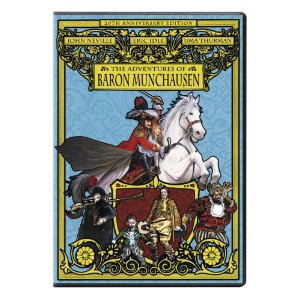Wednesday, April 18, 2012
Random Movie Report #104: The Adventures of Baron Munchausen
It's both ironic and understandable that an enchanting fairytale like The Adventures of Baron Munchausen was an absolute nightmare behind the scenes. It was one of the biggest flops of its day, largely due to Columbia Pictures' decisions not to support a film greenlit by the last administration and to only strike a grand total of 120 prints during its entire theatrical run. But you can't say it doesn't deliver. Indeed, it's one of the most straightforwardly satisfying movies Gilliam's ever made, a wonderfully overstuffed, chaotic spectacle designed to leave the viewer dazed, tired, but happy. Gilliam clearly doesn't believe in leaving 'em wanting more, but his excess has a purpose, and at the core of the film is an affirmation of mad fantasy in the face of insurmountable sanity.
It's the Age of Reason, and an unnamed town in Europe is under siege by the Turks. In an attempt to distract everyone from their sure-to-be-short lives, a small theatrical company is putting on a play about the exploits of famous adventurer/liar Baron Munchausen, only to be interrupted by the real Munchausen (John Neville), who sets about telling everyone what really happened and why the Sultan (Peter Jeffrey) is after his head. Sally (Sarah Polley), the theater owner's daughter, convinces the Baron to help fight off the Sultan, and he decides to do so by rounding up his old friends, the speedy Berthold (Eric Idle), the strong Albrecht (Winston Dennis), eagle-eyed marksman Adolphus (Charles McKeown), and Gustavus (Jack Purvis), a man with giant ears and powerful lungs. In their quest to find these men, the Baron and Sally travel to the moon, the center of the Earth, and the South Seas, meeting up with sea monsters, the King of the Moon ("Ray D. Tutto", bearing a resemblance to Robin Williams), and the godly couple of Vulcan (Oliver Reed) and Venus (Uma Thurman).
This is definitely an episodic film, adapted as it is from a series of stories that never had much structure beyond being the stories of a man given to stretching the truth. However, any resulting slack in the narrative is taken up by some of the most intense imagery Gilliam can throw at the viewer. It's reminiscent of the filmmaker's Time Bandits, but bigger, louder, and somehow weirder; some of the transitions, like the trip to the moon over a stormy sea which becomes an ocean of moon dust, are downright poetic. Though a hellish production resulted in the film going way over budget, and some sequences were altered or discarded, the movie certainly looks like a 50 million dollar colossus, with vast armies, crumbling cities, giant fish monsters, flying heads, clockwork birds, and the angel of death himself. Michael Kamen's score, owing much to Korngold, raises the film's energy level still higher.
It's almost too much, and it can be wearying. The film lightens the viewer's burden with a wry, Pythonesque humor, as well as a baroque grace in its images. The moon is surrounded by living constellations, an eternal game of cards in the belly of the fish threatens to draw the Baron to his death, and the Baron and Venus share a waltz that leads them into the sky, and this after she emerges naked from a clamshell a la Botticelli. Neville is ideally cast, playing his part with an old man's weariness mixed with an arrogance that somehow manages to be charming- it's the old tough exterior masking a heart of gold, and it's hard to make work. Polley makes a very good impression as well, and Jonathan Pryce has a lot of fun turning his Brazil role on its head and playing the secondary villain of the piece, a civil servant insisting that the war, however brutal, be conducted according to logic.
This is where the story gets interesting. In many ways it's a continuation of the themes Gilliam was exploring in his 1985 magnum opus, and unofficially Time Bandits, Brazil, and Munchausen have been lumped together as a trilogy, the first dealing with childhood, the second adulthood, and the third old age. The Baron is briefly rejuvenated by his encounters with the fantastic, and is disappointed by the fact that his companions have had their powers tempered by time, but a part of him wants to die, especially since the world has grown too sensible for him. Only Sally can keep him going, reminding him frequently of his promise to save the town. The Baron's dance with death is arguably the real heart of the story, though it's intertwined with his conflict with the enlightened world- youth is a time of infinite possibility, and just as adventure rejuvenates him, every closed off possibility is years off his life. Portraying reason as the enemy may seem distasteful to current liberal sensibilities, but the film is unapologetic.
Though the story sometimes suffers in its need to cram in every fantastic thing imaginable, The Adventures of Baron Munchausen is still a gem. It's a brilliant twist on the Hollywood concept of the movie as thrill ride; that may usually mean it's nice to look at and has lots of action, but for Gilliam it means taking the audience to the very highest and lowest reaches of the imaginative realm, and near exhausting us from the motion. It's a valid goal, as much as it is to devastate the audience through tragedy or through rapt suspense. That Gilliam manages to deliver on this more than Michael Bay ever could is significant; that the story still has a mad heart beating underneath is worthy of high praise indeed.
Based on the stories by Gottfried August Burger and Rudolph Erich Raspe
Screenplay by Charles McKeown and Terry Gilliam
Directed by Terry Gilliam
Grade: A-
Subscribe to:
Post Comments (Atom)

No comments:
Post a Comment